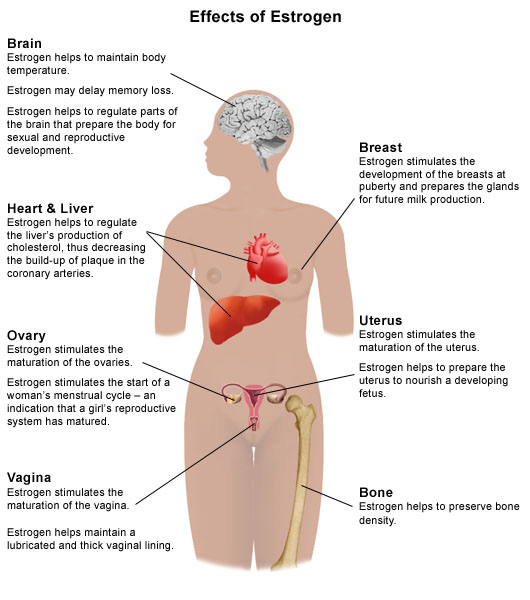Estrogen is nothing but one of the most important hormones necessary for the natural development and growth of breasts and other organs that play role in childbearing. The primary use of this hormone is to help control the menstrual cycles and essential for reproduction. However, women’s risk for breast cancer is associated when the estrogen remains in the body for a prolonged period. This article will help you understand several different facts like how estrogen works in the body, how chemicals in the atosphere affect the estrogen levels in the body, how lifestyle and diet affect the estrogen exposure and many more.

What is Estrogen?
Estrogen is a hormone which acts as a chemical messenger in the body. Following are some of the important uses of this hormone:
- Normal sexual development
- Functioning of female organs which are important for childbearing
- Regulates the menstrual cycles
- Normal development of breasts
- Maintain the heart and healthy bones
Estrogen exposure and women’s risk for breast cancer
There are many reasons why estrogen exposure is implicated along with women’s risk of breast cancer. Since the hormone plays an important role in stimulating breast cell division, its effect on other hormones that encourage breast cell division, the work it performs during the critical periods of breast growth and development and its support of the growth of estrogen responsive tumors.
How lifestyle factors affect levels of estrogen in the body?
Diet and lifestyle are two of the important constraints that affect levels of estrogen in the body. Following is detailed explanation on how diet and other factors affect levels of estrogen in women’s body:
- Diet: The estrogen is an important hormone in the body. Usually the diets that are low in fat and high in fiber may decrease the levels of this hormone. Thus, certain dietary factors may increase breast cancer risk directly by increasing the estrogen hormone levels in the blood. Excessive intake of fats, which leads to obesity, also increases the risk of postmenopausal breast cancer.
- Body Weight: One of the greatest inventions recently has helped in cracking one of the major symptoms of breast cancer. The research concluded that weight gain in women just before and after menopause increases the risk of breast cancer. Usually, the ovary stops generating estrogen after menopause. On the other hand, women’s body fat is another source from where the estrogen is produced. Hence, a woman with a higher level of body fat is expected to have a higher level of these hormones, increasing the risk of breast cancer.
- Exercise: It has been proved that women who perform regular exercise are less prone to breast cancer. Regular exercise often helps in reducing the excessive body fat in the body thus reducing the body estrogen levels. Most of the time exercises extend the length of a women’s menstrual cycle. Longer menstrual cycles then correspond with fewer cycles over a lifetime and fewer cycles can result in less lifetime exposure to estrogen.
- Alcohol: Excessive intake of alcohol increases the risk of breast cancer. It has been researched that alcohol increases the amount of estrogen circulation within the women’s body. Hence, one must ensure whether or not and how much to drink.
- Birth Control Pills: Breast cancer due to birth control pills depends upon the level of estrogen in the pills. Also, the other factors for breast cancer exposure due to birth control pills include the duration of its intake and the age at which these are consumed.
- Postmenopausal Hormone Treatment: After menopause, the women’s ovary stops producing estrogen. The sudden loss of estrogen then leads to the risk of several heart and blood vessel diseases. Several hormone treatments are then used to relieve the discomforting menopausal symptoms. These treatments then raise the risk of breast cancer.
Relationship between breast cancer risk, estrogen and environmental chemicals
The medical science has still not been able to explain half of breast cancer cases, many researches think that chemicals in the environment are responsible for the breast cancer risks. These theories usually depict that the environmental chemicals either mimic the effect of estrogen or affect the levels of estrogen in the body indirectly by disrupting the way estrogen is produced or used in the body.
Conclusion
Estrogen is essential for the normal functioning of a women’s reproductive system and for normal breast development. However, lifelong exposure to this hormone raises the risk of breast cancer. Understanding how estrogen works within the body, how the chemicals in the environment mimic the effects of this hormone, how hormone replacement therapy is related to breast cancer, and other factors that generate risk between estrogen and breast cancer risk will help you in preventing yourself from this disease.
Read more:

